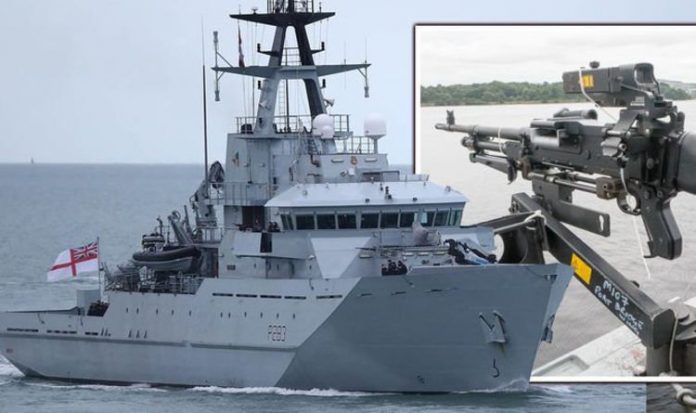Royal Navy uses jet suit to practice storming ship
Although the offshore patrol ships carry machine guns, they would not be expected to use weapons against EU fishing boats. Instead they would aim to run alongside a vessel believed to be breaking the rules, boarding it for inspection if deemed necessary. In extreme cases an EU boat could be impounded and taken to the nearest UK port.
The dramatic development came as French President Emmanuel Macron appeared to scupper any chance of a breakthrough in Brexit trade talks yesterday.
In hardline comments in Brussels, he refused to budge on the crunch issue of fishing rights.
Meanwhile, with cross-Channel tensions worsening, Prime Minister Boris Johnson warned a no-deal split from the EU was now “very, very likely”.
He later chaired a meeting, attended by Cabinet Office minister Michael Gove and other senior officials, to “take stock” of Government plans for a no-deal exit, Number 10 confirmed.
Naval sources said the ship deployment had long been planned, while the Ministry of Defence said “extensive planning” has been taken to ensure Britain is ready when the Brexit transition period ends on December 31.
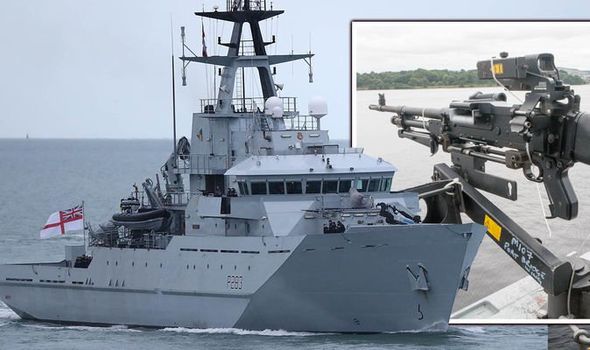
The ships would not be expected to use weapons against EU fishing boats (Image: Getty)
An insider said: “Nobody is going to be firing warning shots against French fishermen; firearms are only used when there is danger to life.” But the deployment of the 262ft vessels will crank up tensions even more, evoking memories of the 1970s “cod wars”.
Former Navy chief Lord West said yesterday: “I don’t think people will go around shooting at each other but if people are bolshy when fishing, it can be difficult. You have to be robust.
“Normally, you let the vessel escape and when they get back to their home port you get their own country to prosecute them, but Europe is not going to prosecute its own fishing boats.”
Lord West said the Royal Navy’s frontline Fishery Protection Squadron, which patrols the UK’s Extended Fisheries Zone, would have to be beefed up.
The Labour peer said: “It had shrunk to about four vessels. In living memory it was about 17 vessels and used to protect fishing boats off Russia’s Kola Peninsula, Iceland and the Newfoundland Grand Banks.
“If the Government says we should stop foreign fishing vessels fishing, the Navy will be the people to stop that happening. That will take a certain effort.
“At the moment the squadron enforces fishing rules such as making sure nets are the right size, with people who are compliant.
“If suddenly you have to stop people illegally fishing in your waters, that’s a bigger task.”
He added: “Let’s look at the cod war in the 1970s. People were ramming each other and trying to cut each other’s fishing nets.”
Britain and the EU are at loggerheads over fishing rights and for how long the UK will allow other countries to have access to our waters after we leave.
In a further sign the “entente cordiale” between France and the UK is beginning to fray, Mr Macron demanded access to British fishing waters for years to come. He told an EU summit: “I’m not asking to have my cake and eat it, no. All I want is a cake that’s worth its weight. Because I won’t give up my share of it either.”
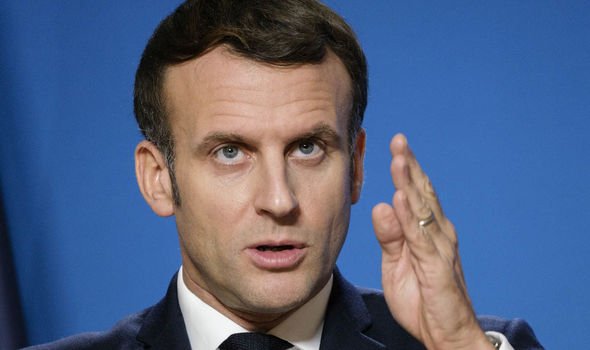
Emmanuel Macron demanded access to British fishing waters for years to come (Image: Getty)
Mr Macron earlier rejected a plea from Mr Johnson to speak to him and German Chancellor Angela Merkel by phone, in the hope of easing trade deal negotiations.
But just 36 hours before tomorrow’s deadline for reaching a deal, Mr Johnson was told he must speak to the EU’s chief negotiator Michel Barnier instead.
If no agreement can be reached both sides say talks will end, paving the way for a no-deal departure when the Brexit transition period ends on December 31.
Brussels is said to be fighting for at least 10 years of fishing access, but Britain will agree only to a phased approach for a few years at most.
There are also major differences over the so-called level playing field issue – a set of common rules and standards that prevent businesses in one country gaining competitive advantage over those in other nations.
Following the French intervention, Mr Johnson vowed that going it alone would be a “wonderful” opportunity for the UK. During a visit to Blyth, in Northumberland, the Prime Minister said: “There are two key things where we just can’t seem to make progress.
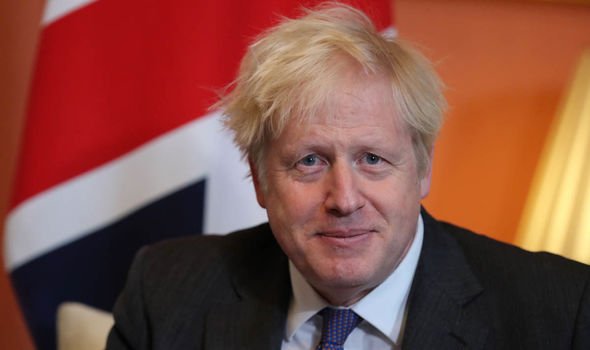
Mr Johnson vowed that going it alone would be wonderful for the country (Image: Getty)
“And that’s this kind of ratchet clause they’ve got in to keep the UK locked in to whatever they want to do in terms of legislation, which obviously doesn’t work.
“And then there is the whole issue of fish where we’ve got to be able to take back control of our waters.
“So there is a way to go – we’re hopeful that progress can be made.
“But from where I stand now, it is looking very, very likely that we will have to go for a solution that I think would be wonderful for the UK and we’d be able to do exactly what we want from January.
“It obviously would be different from what we’d set out to achieve but I have no doubt this country can get ready and, as I say, come out on World Trade terms.”
Without a deal, EU boats would be banned from fishing in the UK’s Exclusive Economic Zone and UK fishing boats would be barred from the waters of nearby EU states.
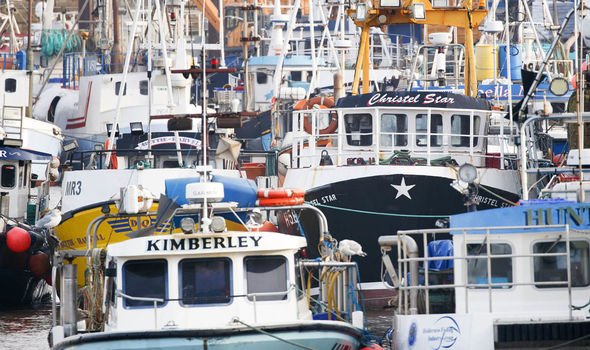
Without a deal, EU fishing boats would be banned from UK waters (Image: PA)
Highlighting the significance of the crisis, the EU this week proposed a one-year extension to the transition period for fishing to allow a deal to be negotiated. Speaking at the end of yesterday’s meeting of EU leaders, European Commission president Ursula von der Leyen said: “We understand that the UK aspires to control its waters.
“The UK must, on the other hand, understand the legitimate expectations of EU fishing fleets built on decades and sometimes centuries of access. On these and other points, our negotiators are working. We will decide on Sunday whether we have the conditions for an agreement.”
She added: “One way or the other, in less than three weeks it will be new beginnings for old friends.”
Irish PM Micheal Martin said a no-deal Brexit was now the “prevailing mood” among EU leaders.
Mr Johnson said on Thursday that the Cabinet should “get on and make those preparations” for a departure on terms like Australia’s.
Unlike Canada, Australia does not have a trade deal with Europe.
European and British boats have long fished in each other’s waters with EU trawlers taking 60 per cent of the catch from the UK area.
A large part of the catch is mackerel and herring, which is not popular in Britain and therefore exported.
Fish popular in the UK, such as cod, is usually imported.
A spokesman for the Ministry of Defence said: “The MoD has conducted extensive planning and preparation to ensure that defence is ready for a range of scenarios at the end of the transition period.”
